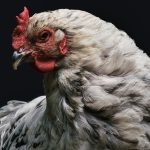Chickens require specific care during winter to maintain their health and well-being. Essential elements of winter chicken care include:
1. Shelter: Provide a dry, draft-free coop to protect chickens from cold and harsh weather.
2. Ventilation: Ensure proper air circulation in the coop to prevent moisture buildup and maintain air quality. 3.
Nutrition: Offer a balanced diet and increase feed quantities to help chickens maintain body heat. 4. Hydration: Ensure constant access to fresh, unfrozen water.
5. Frostbite prevention: Monitor for and protect against frostbite, particularly on combs and wattles. 6.
Supplemental heat: In extreme cold, consider providing additional heat sources, but use caution to prevent fire hazards. 7. Adaptability: Adjust care practices based on local climate conditions and individual flock needs.
While chickens are generally hardy, they can be affected by cold weather. Proper winter care helps maintain their health, comfort, and egg production. Regular monitoring and addressing specific needs will ensure chickens thrive during colder months.
Table of Contents
- 1 Providing Adequate Shelter and Protection from the Elements
- 2 Adjusting Feeding and Watering Practices for Cold Weather
- 3 Maintaining Proper Ventilation and Air Quality in the Coop
- 4 Preventing Frostbite and Other Cold-Related Health Issues
- 5 Implementing Heating Options for Extreme Cold Conditions
- 6 Monitoring and Adjusting Care Practices as Winter Conditions Change
- 7 FAQs
- 7.1 What are the main challenges of keeping chickens alive in the winter?
- 7.2 How can I keep my chickens warm in the winter?
- 7.3 What should I feed my chickens in the winter?
- 7.4 How can I prevent frostbite in my chickens?
- 7.5 How much light do chickens need in the winter?
- 7.6 What are some common health issues for chickens in the winter?
Key Takeaways
- Chickens need extra care in winter to stay healthy and comfortable
- Provide a draft-free, insulated coop with proper bedding for warmth
- Increase feed to help chickens generate body heat and ensure access to unfrozen water
- Proper ventilation is crucial to prevent moisture buildup and maintain air quality
- Check for signs of frostbite and other health issues regularly
- Consider heating options like heat lamps or heated perches for extreme cold
- Monitor weather conditions and adjust care practices as needed
Providing Adequate Shelter and Protection from the Elements
Insulation and Draft-Proofing
To provide adequate shelter for your chickens during the winter, it’s essential to ensure that their coop is well-insulated and free from drafts. This can be achieved by sealing any gaps or cracks in the walls and windows, as well as adding insulation to the coop if necessary.
Ventilation and Bedding
It’s also crucial to ensure that the coop is well-ventilated to prevent moisture buildup, which can lead to respiratory issues in chickens. Providing a dry bedding material such as straw or wood shavings can help keep the coop warm and dry.
Protection from the Elements
Protection from the elements is vital for the well-being of your flock during the winter months. This can be achieved by providing a covered outdoor area where chickens can still have access to fresh air and exercise without being exposed to harsh weather conditions. Additionally, providing windbreaks such as tarps or bales of hay can help protect chickens from strong winds and snow.
By providing adequate shelter and protection from the elements, you can help ensure that your chickens remain healthy and comfortable throughout the winter.
Adjusting Feeding and Watering Practices for Cold Weather

During the winter months, it’s important to adjust your chickens’ feeding and watering practices to ensure that they are receiving the nutrients and hydration they need to stay healthy. Chickens require more energy to stay warm in cold weather, so it’s important to provide them with a balanced diet that includes plenty of protein and carbohydrates. This can be achieved by offering a high-quality layer feed supplemented with grains such as corn or oats.
Additionally, providing access to fresh greens or vegetable scraps can help ensure that your chickens are receiving a well-rounded diet. In addition to adjusting their diet, it’s also important to ensure that your chickens have access to fresh water at all times. In cold weather, water sources can freeze quickly, so it’s important to check on your chickens’ water supply frequently and provide them with fresh water as needed.
Using heated waterers or adding a small amount of apple cider vinegar to their water can help prevent freezing and keep your chickens hydrated. By adjusting their feeding and watering practices, you can help ensure that your chickens remain healthy and well-nourished throughout the winter months.
Maintaining Proper Ventilation and Air Quality in the Coop
Proper ventilation is essential for maintaining good air quality in the chicken coop, especially during the winter months when windows and doors are often kept closed to keep out the cold. Poor ventilation can lead to a buildup of moisture and ammonia from chicken droppings, which can cause respiratory issues and other health problems for your flock. To maintain proper ventilation in the coop, it’s important to provide adequate airflow without creating drafts.
This can be achieved by installing vents near the roofline of the coop to allow warm, moist air to escape without creating drafts at ground level where the chickens roost. In addition to proper ventilation, it’s also important to maintain good air quality in the coop by keeping bedding clean and dry. Regularly cleaning out soiled bedding and adding fresh bedding as needed can help prevent moisture buildup and reduce ammonia levels in the coop.
Providing adequate space for your chickens can also help maintain good air quality, as overcrowding can lead to increased levels of ammonia and other harmful gases. By maintaining proper ventilation and air quality in the coop, you can help ensure that your chickens remain healthy and comfortable throughout the winter months.
Frostbite is a common cold-related health issue that can affect chickens during the winter months, especially on their combs, wattles, and feet. To prevent frostbite, it’s important to provide adequate shelter and protection from the elements, as well as ensuring that your chickens have access to dry bedding and a draft-free environment. Additionally, providing supplemental heating in extreme cold conditions can help prevent frostbite by keeping the coop warm enough to prevent freezing temperatures.
In addition to frostbite, chickens are also susceptible to respiratory issues in cold weather due to poor ventilation and air quality in the coop. To prevent respiratory issues, it’s important to maintain proper ventilation and air quality by providing adequate airflow without creating drafts, as well as keeping bedding clean and dry to reduce moisture buildup and ammonia levels. By taking steps to prevent frostbite and other cold-related health issues, you can help ensure that your chickens remain healthy and comfortable throughout the winter months.
Implementing Heating Options for Extreme Cold Conditions

Heating Options for Chicken Coops
In extreme cold conditions, supplemental heating may be necessary to keep your chickens warm and prevent frostbite. There are several heating options available for chicken coops, including heat lamps, radiant heaters, and heated pads or perches.
Safety Precautions When Using Supplemental Heating
When using supplemental heating, it’s important to ensure that it is installed safely to prevent fire hazards and that it is used in conjunction with proper ventilation to prevent moisture buildup.
Maintaining a Safe Temperature in the Coop
It’s also important to monitor the temperature in the coop when using supplemental heating to ensure that it remains within a safe range for your chickens. The ideal temperature for a chicken coop in winter is around 45-50 degrees Fahrenheit, as this is warm enough to prevent frostbite but not so warm that it encourages respiratory issues or excessive energy consumption.
By implementing heating options for extreme cold conditions, you can help ensure that your chickens remain warm and comfortable throughout the winter months.
Monitoring and Adjusting Care Practices as Winter Conditions Change
As winter conditions can vary greatly depending on location, it’s important to monitor and adjust care practices accordingly to ensure the comfort and safety of your chickens. This may include checking on your chickens more frequently during extreme cold weather, providing additional bedding or windbreaks as needed, or adjusting feeding and watering practices based on temperature fluctuations. It’s also important to keep an eye out for signs of cold-related health issues such as frostbite or respiratory problems and take action promptly if any issues arise.
By monitoring and adjusting care practices as winter conditions change, you can ensure that your chickens remain healthy and comfortable throughout the winter months. This may require some extra effort on your part, but it’s well worth it to ensure the well-being of your flock during this challenging time of year. With proper care and attention, you can help your chickens not only survive but thrive during the winter months.
If you’re looking for tips on how to keep chickens alive in the winter, you may also be interested in learning about how to insulate a chicken coop. This article from Poultry Wizard provides valuable information on the importance of insulating your coop to protect your chickens from the cold weather. Check it out here for helpful tips and advice.
FAQs
What are the main challenges of keeping chickens alive in the winter?
The main challenges of keeping chickens alive in the winter include cold temperatures, frostbite, lack of sunlight, and potential for dehydration.
How can I keep my chickens warm in the winter?
To keep chickens warm in the winter, provide a well-insulated coop with proper ventilation, use heat lamps or heated pads, and provide plenty of bedding for them to nestle in.
What should I feed my chickens in the winter?
In the winter, it’s important to provide your chickens with a balanced diet that includes high-quality layer feed, as well as access to fresh water and occasional treats like scratch grains and mealworms.
How can I prevent frostbite in my chickens?
To prevent frostbite in chickens, make sure their coop is well-insulated and draft-free, provide roosts with wide flat surfaces for them to perch on, and apply petroleum jelly to their combs and wattles to protect them from the cold.
How much light do chickens need in the winter?
Chickens need at least 14 hours of light per day to continue laying eggs in the winter. If natural sunlight is limited, consider using artificial lighting in the coop to supplement their light exposure.
What are some common health issues for chickens in the winter?
Common health issues for chickens in the winter include respiratory infections, frostbite, and dehydration. It’s important to monitor your chickens closely and provide proper care to prevent these issues.
Meet Walter, the feathered-friend fanatic of Florida! Nestled in the sunshine state, Walter struts through life with his feathered companions, clucking his way to happiness. With a coop that’s fancier than a five-star hotel, he’s the Don Juan of the chicken world. When he’s not teaching his hens to do the cha-cha, you’ll find him in a heated debate with his prized rooster, Sir Clucks-a-Lot. Walter’s poultry passion is no yolk; he’s the sunny-side-up guy you never knew you needed in your flock of friends!







